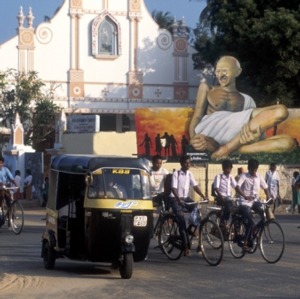
"I’m 40 and still regarded as a youth.” It was the early summer of 1995, and a local community worker of Pakistani-British heritage was showing me around the rough and sloping ground of a local youth cricket club in Bradford, West Yorkshire, run without any support from official sports bodies.
I’d come up to make a special report for BBC News in the aftermath of the Manningham Riots, a short but intense period of youth rioting provoked by alleged police brutality in Bradford, which hosts the largest population of people of Pakistani heritage of any city in England. I was there to try to understand the roots of the violence, which had taken the nation by surprise. The un-level playing field proved a handy metaphor for how two generations of young British Asians were being failed by both indifference from the civic authorities at large and the conservative social strictures of their own community.
Twenty-five years later, after watching 30-year-old Azeem Rafiq testify before a Commons select committee in October 2021 about the spirit-breaking racism he’d endured for years, I remembered that encounter. The teen cricket prodigy, who grew up in Barnsley, 30 miles from Bradford, had captained England’s under-15s and became Yorkshire’s youngest ever captain.
Yorkshire County Cricket Club’s leadership stayed in denial until sponsors pulled out. Enemies then signed letters slandering Rafiq’s character and dredged up years-old tweets of antisemitic comments he had made (for which he showed full contrition and met Jewish organisations to make amends), thereby undermining the veracity of his own trauma. How could so little have changed?
Over the years I have come to realise that Bradford and its environs are emblematic of the UK’s wider social crises and broken promises. As a journalist from London, my 1995 post-riot visit offered a limited glimpse into how traditional political racial solidarity had been splintered by social and religious division. The book burnings of The Satanic Verses in 1989 had been the first shock. Who were these people burning books for “blasphemy”? When I went back after the 2001 Bradford riots, this time for Channel 4 News, a white social worker informed me I was being “racist” for asking about forced marriage.
I met a female social worker who had previously been part of the domestic violence support group Southall Black Sisters and recently moved to the city. She told me she had attended a meeting where self-appointed male community leaders had demanded that all complaints of domestic violence be referred to them to be dealt with. The police would have agreed, she said, if she hadn’t been there to object.
Bradford was one of several English towns where in the past decade British Asian sexual grooming gangs have been convicted of abusing teenage girls. My own encounters in the city seemed evidence of a widespread culture of denial and misogyny, within council services and the police as much as in the community: a culture that had allowed abusers to prosper from Rochdale and Rotherham in Yorkshire to Telford and Oxford.
***
There is more, however, to Bradford. As a member of the advisory board for the city’s National Science and Media Museum I’ve fallen in love with its grand Victorian buildings and the buzz of its brutalist Oastler market, selling food from across the globe. There’s a distinctive attitude and pride, while its citizens come up again and again with their own solutions to help tackle poverty and underachievement.
I was hopeful when, in 2021, Channel 4 opened a new programming hub in Leeds as part of their commitment to the Leeds/Bradford area. What Bradford – Britain’s ninth largest city – desperately needed was proper transport infrastructure to make the most of it. But when HS2 was scaled back late last year, these plans were abandoned. Residents will continue to rely on an often-disrupted connection to Leeds, limiting opportunities and job prospects.
Azeem Rafiq should have been in his prime years on the England team. Instead, this sportsman has gone through the trauma of reliving the abuse and taunts before an audience. As if it defines him. It doesn’t. He’s a hero.
If you want to know if politicians’ pledges of levelling up are kept, watch Bradford and its nearby towns. They’ve seen too many broken promises over the past 25 years. When we finally invest properly in its infrastructure and treat its talented sons and daughters with the respect and care they deserve, we’ll know the truth about that much-claimed British value of fair play.
This piece is from the New Humanist spring 2022 edition. Subscribe today.

